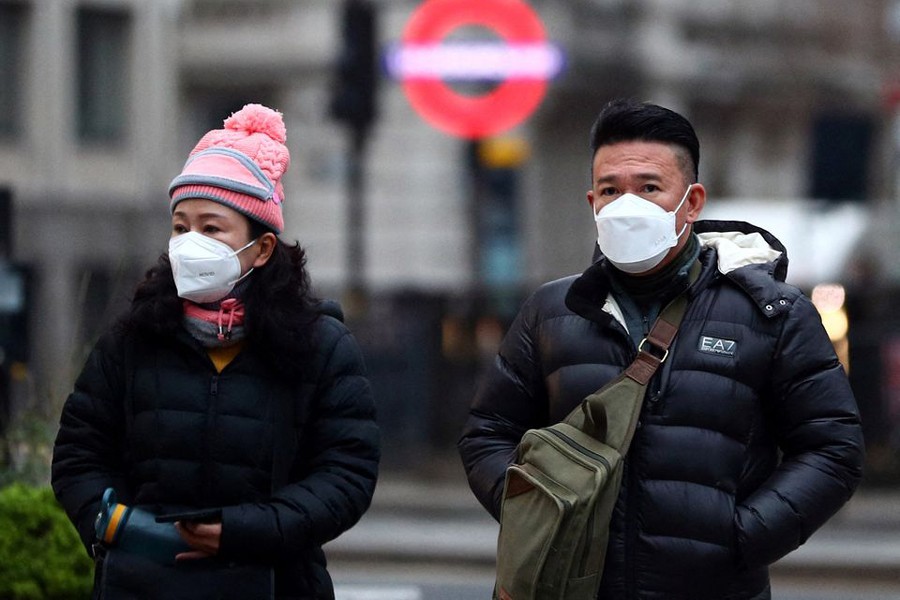Countries across Europe considered new curbs on movement on Tuesday while US President Joe Biden called on military medics to support hospitals and fight the Omicron variant sweeping the world days before the second Christmas of the pandemic.
Omicron infections are multiplying across Europe, the United States and Asia, including in Japan, where a single cluster of Covid-19 cases at a military base has grown to at least 180, reports Reuters.
"We can see another storm coming," said Hans Kluge, the World Health Organization's European head, warning European countries to brace for a "significant surge" in Covid-19.
Biden struck a dire tone about the risks to the one in four American adults still unvaccinated. He planned to lay out new measures on testing on Tuesday, an administration official said.
The steps include activating some 1,000 military medical personnel to support hospitals already being overwhelmed.
Israel recorded its first known death from the omicron variant, according to Israeli news media which reported that an elderly man died in Beersheba on Monday.
Germany, Scotland, Ireland, the Netherlands and South Korea are among countries to have reimposed partial or full lockdowns or other social distancing measures in recent days.
Portugal ordered nightclubs and bars to close and told people to work from home for at least two weeks from Saturday.
Nicola Sturgeon, first minister of Scotland - part of the United Kingdom but with devolved responsibilities for health - set out plans for further restrictions on big public events, including sports fixtures, for three weeks after Christmas.
"It will also mean unfortunately that large scale Hogmanay celebrations, including that planned here in our capital city (Edinburgh), will not proceed," she said, referring to traditional Scottish New Year parties.
New Zealand Covid-19 Response Minister Chris Hipkins said his country, which imposed some of the world's toughest Covid-19 measures, was delaying the start of a staggered reopening of its border until the end of February.
"All of the evidence so far points to Omicron being the most transmissible COVID-19 variant yet," he said.
Chancellor Olaf Scholz said Germany will introduce new steps including limiting private gatherings for vaccinated people to a maximum of 10 before New Year's Eve. Scholz agreed with the premiers of the 16 federal states that big events, including football matches, would be without spectators.
The WHO's Kluge told a news conference in Vienna that within weeks omicron would dominate in more countries of the region, "pushing already stretched health systems further to the brink."
British Prime Minister Boris Johnson said he would not introduce new Covid-19 curbs in England before Christmas, but the situation remained extremely difficult and the government might need to act afterwards.
Finance minister Rishi Sunak announced 1 billion pounds ($1.3 billion) of extra support for businesses hit hardest by omicron, which is hammering the hospitality sector and other businesses.
'I Understand That Many Are Tired'
Omicron's rapid spread means many Britons are changing Christmas plans last-minute, despite a lack of formal curbs.
Twenty-four-year-old medical student Rebecca Gilmore, who lost her younger brother to suicide earlier in the year, said being apart from her family was especially hard this year but self-isolating with her partner was the right thing to do.
"It means I'm protecting the most vulnerable people," she said.
Sweden will urge all employees to work from home if possible and impose tighter rules for social distancing.
"I understand that many are tired of this - so am I - but we now have a new virus variant, which means we are in a new situation," said Prime Minister Magdalena Andersson.
Omicron has hit financial markets hard in recent days, raising investor fears for the global economic recovery as the pandemic cuts travel and seizes up supply chains.
But world shares gained on Tuesday, with the dollar softening as appetite for riskier assets made a cautious return. The broader Euro STOXX 600 rose 1.3 per cent. Germany's DAX's added 1.27 per cent, with London's FTSE climbing 0.99 per cent.
Wall Street's main indexes rose, following a steep selloff in the previous session.
In Australia, where omicron has surged but hospitalisations remain relatively low, Prime Minister Scott Morrison urged state and territory leaders to avoid further lockdowns.
In the United States, the Biden administration said it would open federal Covid-19 testing sites in New York this week and buy 500 million at-home rapid tests that Americans can order online for free starting in January.
Omicron now accounts for 73 per cent of all new cases in the United States, up from less than 1 per cent at the beginning of the month.
New York City Mayor-elect Eric Adams is postponing his inauguration ceremony, which was set for January 1, due to the rise in omicron cases, he said.
The variant was first detected last month in southern Africa and Hong Kong and has been reported in at least 89 countries.
The severity of illness it causes remains unclear, but the WHO warned it is spreading faster than the delta variant and is causing infections in people already vaccinated or who have recovered from the Covid-19 disease.
More than 274 million people have been reported to be infected by the coronavirus globally since the pandemic began nearly two years ago. More than 5.65 million people have died.


